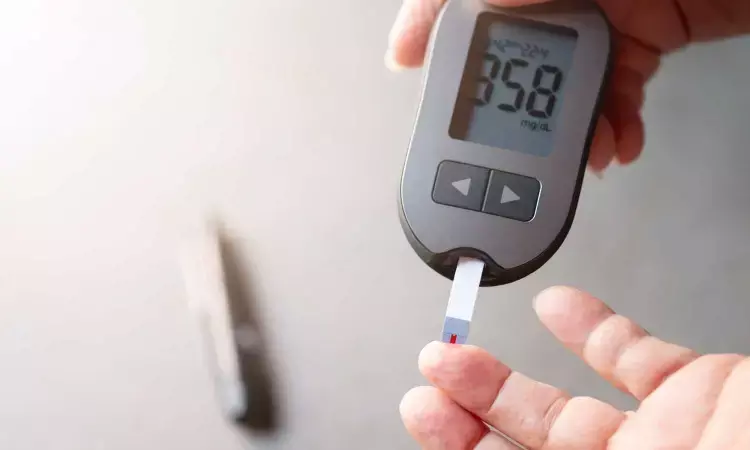- Home
- Medical news & Guidelines
- Anesthesiology
- Cardiology and CTVS
- Critical Care
- Dentistry
- Dermatology
- Diabetes and Endocrinology
- ENT
- Gastroenterology
- Medicine
- Nephrology
- Neurology
- Obstretics-Gynaecology
- Oncology
- Ophthalmology
- Orthopaedics
- Pediatrics-Neonatology
- Psychiatry
- Pulmonology
- Radiology
- Surgery
- Urology
- Laboratory Medicine
- Diet
- Nursing
- Paramedical
- Physiotherapy
- Health news
- Fact Check
- Bone Health Fact Check
- Brain Health Fact Check
- Cancer Related Fact Check
- Child Care Fact Check
- Dental and oral health fact check
- Diabetes and metabolic health fact check
- Diet and Nutrition Fact Check
- Eye and ENT Care Fact Check
- Fitness fact check
- Gut health fact check
- Heart health fact check
- Kidney health fact check
- Medical education fact check
- Men's health fact check
- Respiratory fact check
- Skin and hair care fact check
- Vaccine and Immunization fact check
- Women's health fact check
- AYUSH
- State News
- Andaman and Nicobar Islands
- Andhra Pradesh
- Arunachal Pradesh
- Assam
- Bihar
- Chandigarh
- Chattisgarh
- Dadra and Nagar Haveli
- Daman and Diu
- Delhi
- Goa
- Gujarat
- Haryana
- Himachal Pradesh
- Jammu & Kashmir
- Jharkhand
- Karnataka
- Kerala
- Ladakh
- Lakshadweep
- Madhya Pradesh
- Maharashtra
- Manipur
- Meghalaya
- Mizoram
- Nagaland
- Odisha
- Puducherry
- Punjab
- Rajasthan
- Sikkim
- Tamil Nadu
- Telangana
- Tripura
- Uttar Pradesh
- Uttrakhand
- West Bengal
- Medical Education
- Industry
Bariatric surgery superior to standard diabetes management for glycemic control, remission of type 2 diabetes: Study

USA: A study of over 250 participants for up to 12 years revealed that metabolic or bariatric surgery results in less medication use, superior glycemic control, and higher remission rates of type 2 diabetes than medical or lifestyle intervention in patients with class 1 obesity. The results were presented at the 83rd Scientific Sessions Conference by the American Diabetes Association in San Diego.
The study by researchers of Pennington Biomedical Research Center and others represents the largest cohort of people assessed for the long-term durability of the two treatments.
“The longer the study duration, the stronger the message in terms of remission of type 2 diabetes,” said ARMMS-T2D Principal Investigator John Kirwan, MSc, PhD, Executive Director and the George A. Bray, Jr. Endowed Super Chair in Nutrition, Pennington Biomedical Research Center. “The study addressed the durability of glycemic control after surgery, the longer-term efficacy and safety, and potential reasons some patients experience relapse.”
The study is the longest-running of its kind. From May 2007 to August of 2013, 262 participants with Type 2 diabetes were recruited and randomized into either the metabolic surgery group or the medical/lifestyle intervention group. With a median follow-up of 11 years, those in the metabolic surgery group saw an increased reduction in blood sugar, great rates of diabetes remission, and significantly greater weight loss than those in the medical/lifestyle intervention group.
“These landmark results further enforce our confidence in the success and efficacy of metabolic and bariatric surgery. For patients in serious need of weight loss, and for whom diet, exercise and medication did not produce the desired results, these patients can be assured that this operation is safe. The results are well established,” said Dr. Philip Schauer, Director of Metamor Metabolic Institute at Pennington Biomedical.
At the American Diabetes Association’s conference, Assistant Chief of Clinical Affairs in the Division of Endocrinology, Diabetes and Metabolism at Weill Cornell Medicine New York Presbyterian Dr. Sangeeta Kashyap introduced the study and presented The Case for an RCT of Metabolic Surgery and Type 2 Diabetes.
Physician-scientist Dr. Mary-Elizabeth Patti, an Associate Professor of Medicine at Harvard Medical School, reviewed and shared the study design. Dr. Anita Courcoulas, MPH, FACS, and Chief of the Division of Minimally Invasive Bariatric and General Surgery at the University of Pittsburgh, discussed the long-term outcomes and diabetes remission resulting from the study. Dr. Robert H. Eckel, and past ADA President, Medicine & Science, shared the implications of clinical management of type two diabetes.
Dr Kamal Kant Kohli-MBBS, DTCD- a chest specialist with more than 30 years of practice and a flair for writing clinical articles, Dr Kamal Kant Kohli joined Medical Dialogues as a Chief Editor of Medical News. Besides writing articles, as an editor, he proofreads and verifies all the medical content published on Medical Dialogues including those coming from journals, studies,medical conferences,guidelines etc. Email: drkohli@medicaldialogues.in. Contact no. 011-43720751


